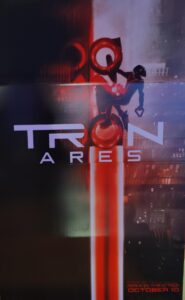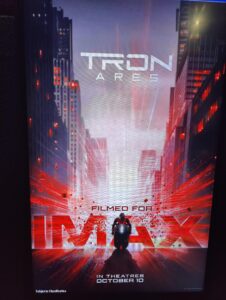
Some quick thoughts after viewing the film in IMAX, as I’m starting to see that the IFC are telling me it’s a bad movie, in ways that I clearly don’t agree with. So let’s talk about what I liked about the film.
The graphics were hyper-stylized, in a way that felt was an homage to some of the sci-fi of the 70s and 80s, and in that way have a much stronger connection to the original Tron film. A lot of the work in that film used costuming and odd camera angles and set design to imagine the insides of the computer, and this was a return to form.
The ladder sequence during Dillinger’s hack was wild to me , a conceptual view of cyberspace, agents, and IC, that felt straight out of a cyberpunk novel in the late 80s or 90s. It’s hard for me to express how much I loved this bit, and the style that it had.
Similar was the return to the set pieces of the original Tron, which were recognizable and felt for lack of a better term “Lo Rez” despite being rendered on the IMAX screen along with the rest of the movie. Simpler, fewer things going on in the background, feeling like an early 3D rendered video game.
As for the tech, it took me a minute to come around, as I originally thoughts the constructs bursting out of the familiar black-carbon “supports” was a little… goofy perhaps, but I came to like it, and it definitely had an aesthetic to them. It left a bit to the imagination of what constitutes the objects – are they holograms, or built out of raw carbon and other elements? It was left undefined, and that’s okay, really. We are allowed to handwave some stuff in our sci-fi to prevent it from bogging down the story.
That being said, I found this approach to addressing the question of digital materiality really interesting. DM is that point where the virtual crosses over to the real world. If cyberspace happens at the point of connection where a telephone conversation takes place in the wires, DM is where our 3D constructs cross over into realspace (or meatspace, or objective reality, however you want to frame it).
Athena was effective in the film – I really liked her as a character – echoing our fears of current real world implementations of AI taking a command too far (“by any means necessary”) to disastrous consequences for Dillinger.
Ares, as an AI gaining emotional intelligence by doing the deep learning on the target of Eve Kim presents a different way. This EQ was what triggered his malfunction, but also pointed towards an avenue for growth for the AIs.

Regarding Ares as a construct in the real world, it’s interesting as he’s clearly Not Human, despite having a human form. He’s a construct , of whatever underlying form that takes, that just doesn’t decompose. We’re not given any indication that he is actually modelled after a human aside from in outward appearances. This provides a nice contrast with the various forms of post-humanity seen in the recent Alien: Earth series, where we had synthetics, cyborgs, and hybrids, in various shapes and forms. Ares represents an AI embodied within a synthetic body, more akin to the synths of Ash, Bishop, and Kirsh, but with significantly enhanced capability.
Ares in the real world is different in this way than the scanned and re-assembled Eve Kim, whose reconstituted body theoretically does not have this problem of permanence (though it’s interesting to ask why not?), but one can follow that her rebuilt body is her being reconstructed cell-by-cell. It’s much like the Teletransportation Paradox, from philosophy but also from Star Trek, as to whether the original body is destroyed and then rebuilt. Here the movie answers it with a clear “yes”, though with more intervening time in between.
The ending leaves open the possibility for further exploring what it is like for an AI to experience the world materially, in a way that is just hinted at in the postcard sequence from Ares. There’s room for some growth here.
Finally, I like how they portrayed the uses for the 3D printing technology with the permanence code enabled. Combating climate change, medical advancements, etc. – a really hopefully version of the future, and less dystopian that similar films like the Matrix and Terminator.
Overall, I enjoyed the film – no prior knowledge of the franchise was really necessary – and it seems odd that the most fantastic thing in a movie about AI, Virtual Reality, and Transhumanism, the most fantastic thing is that one can get across Vancouver in under 29 minutes.